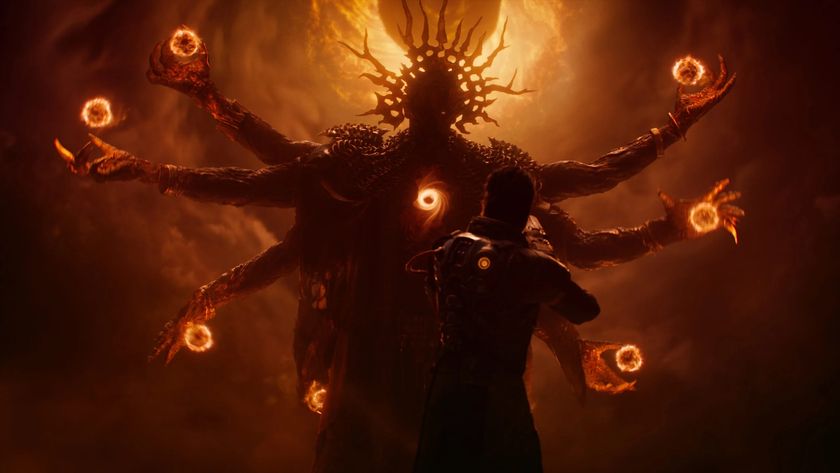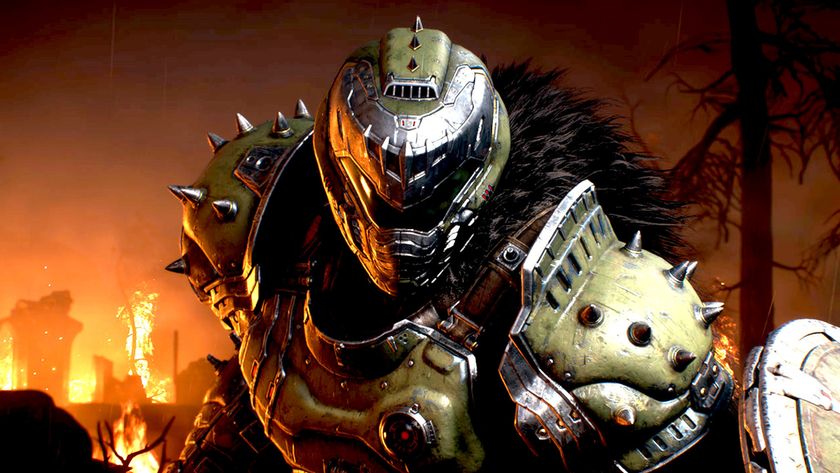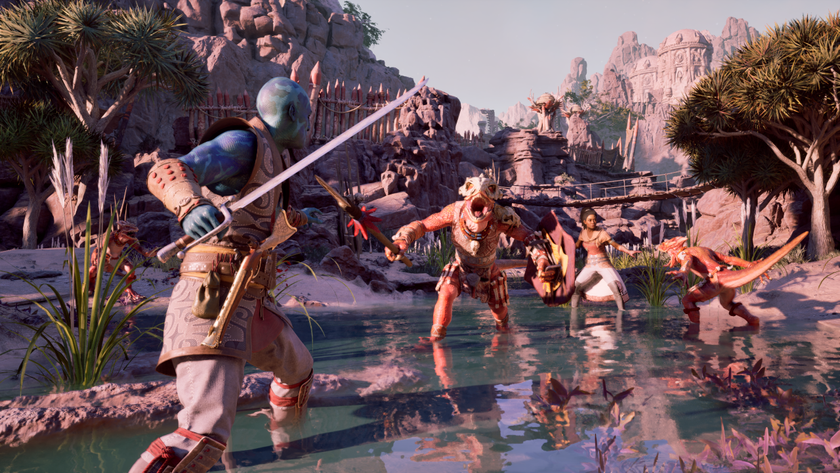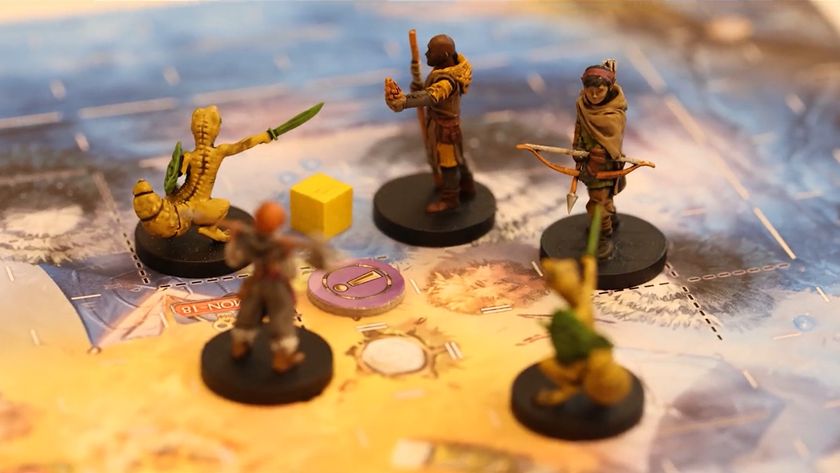An ancient Egyptian Assassin's Creed can't just be business as usual
Assassin’s Creed just loves flicking through the history books and stabbing a hidden blade where it wants to stop off for some free running. As is now apparent by the slews of leaks for Assassin's Creed Origins - oh look, here's our brand new Assassin hero, Bayek, on a t-shirt - we're definitely travelling back to Ancient Egypt. Going by the rumours, we're getting an even more open world this time around with total seamlessness between land and sea. The lone leaked screen above already suggests we'll be spending a bit of time on the ocean wave. Thankfully, it's the Black Flag team working on Origins which means they've got tenure with everything watery but what does all this actually mean for the series? Let’s take a leap of faith into (not-so) wild conjecture.
First off, what’s interesting to note is that the Egyptian setting would see the Creed swing from the most modern outing to date in Assassin’s Creed Syndicate to, literally, the most ancient. Everything that was added to Jacob and Evie’s London adventures to embrace the modern age can be happily removed. The rope launcher, trains, and the not-insignificant addition of proper guns are key toys in London’s playground. To go back to the land of canopic jars (mmmm, organs) and pyramid building - obelisky business - means that will all disappear and the focus can return to the series’ roots of hiding in plain sight. Oh and tombs. Don't forget tombs.
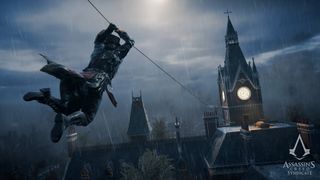
Ubi likes to talk about the Creed having three main ‘pillars’ so to speak. Combat, navigation and stealth. With each addition to the series, each of these is given an update or switch around. Unity added the intuitive, free-run up and down mechanic, while Syndicate brought in the welcome addition of automatically snapping to cover. These were significant changes for the series, and Egypt, by rights, should up the stealth factor once more via a period-enforced focus on physical abilities rather than gadgets. Related to that focus, a new combat upgrade would be welcome. Plus when it comes to navigation, there’s no need to ditch the carriages from Syndicate either. Horses were necessary day to day and an Egyptian war chariot looks like an excellent way to travel.
This time period makes even Altair’s adventures during the Third Crusade look positively post-modern. Ancient Egypt is considered as the mathematically wrong sounding period between 3100BC to 332BC, so the scope here is vast. The below teasery screen - taken from an email conversation between two Abstergo agents in Assassin’s Creed Black Flag - shows two pyramids. One complete and one looking like it’s in the process of being built. The pyramids that make up the Giza complex were built surprisingly early in the period between 2560-2540BC and given Ubi’s delight in its worlds, NPCs constructing pyramids in the background would be a neat touch for some ancient atmosphere.
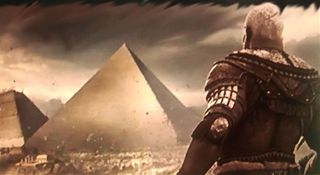
We’re also talking a period in Assassin history that’s mysterious in terms of lore. The Assassins and the Templars always exist in some form - think of them as the eternal Batman and Joker - but this is a period where the Assassin order as we know it now isn’t even a thing. In fact, we’re closer to when the First Civilisation - or Those Who Came Before - did their ‘creating humans’ thing than we’ve ever been. There was an Egyptian Brotherhood of Assassins though - Assassin Amunet killed Cleopatra VII with an asp in 30 BC - but we're probably miles away from that.
This all means the story should be completely unmarred by either real history or existing Assassin’s lore, and is thus full of potential when it comes to setting up a new maguffin to hunt down. Know many famous Ancient Egyptian faces? No, seeing Night At The Museum doesn’t count. The further into the future the series has come, the harder it has been for true freedom in terms of a story for its Assassins. Both Unity and Syndicate managed to steer around their respective Revolutions - French and Industrial - to create a plot full of famous faces, but Ubi is now free to construct its own fantasy of ancient Egypt. Plus, there’s a clear checklist of must-do activities which tie in nicely to previous games in the series.
The architecture of ancient Egypt is a synchronisation hunter’s paradise. The Great Pyramid Of Giza, for instance, was the tallest manmade structure for a mere 3800 years, so consider a leap of faith off that as a given (with scaffolding because otherwise, ouch). And yes, you’ll probably find yourself clambering up the Sphinx at some point too. Much more interestingly however is what’s inside these pyramids. I’ve got one word for you; tombs. We haven’t seen them since Assassin’s Creed 2 but these self contained puzzle rooms were a nice addition at the time to a world that already felt like it was positively overspilling with stabby content. Add in some Eagle Vision, hieroglyphs and the now standard free-run up and down controls, and Egypt could hold some puzzle rooms that might just be able to rival Lara.
Sign up to the 12DOVE Newsletter
Weekly digests, tales from the communities you love, and more

Consider too that this is rumoured to be from the teams who constructed your favourite pirate simulator, Black Flag. That was the last time the series delivered a true seamless Witcher-style open world. Both Syndicate and Unity might have enormous maps, but they are self-contained cities. Go too far across one road at the edge of the map and you’re in unstable memory-ville. Black Flag, on the other hand, sees Edward Kenway leaping aboard the Jackdaw and taking to the seemingly endless horizons of the Caribbean.
Transfer this to Egypt and add in the ships of the desert - watch out, they spit - and the open world potential is tantalising. Think desert mirages and distant ancient Egyptian cities, and you have a game rich in possibilities. Add some spinning aerial shots around pyramids and never-before visited cities, and Egypt makes for a intriguing next step for the series. Oh, and just so you know, I’m calling The Mummy related DLC pack right now.
Louise Blain is a journalist and broadcaster specialising in gaming, technology, and entertainment. She is the presenter of BBC Radio 3’s monthly Sound of Gaming show and has a weekly consumer tech slot on BBC Radio Scotland. She can also be found on BBC Radio 4, BBC Five Live, Netflix UK's YouTube Channel, and on The Evolution of Horror podcast. As well as her work on GamesRadar, Louise writes for NME, T3, and TechRadar. When she’s not working, you can probably find her watching horror movies or playing an Assassin’s Creed game and getting distracted by Photo Mode.


